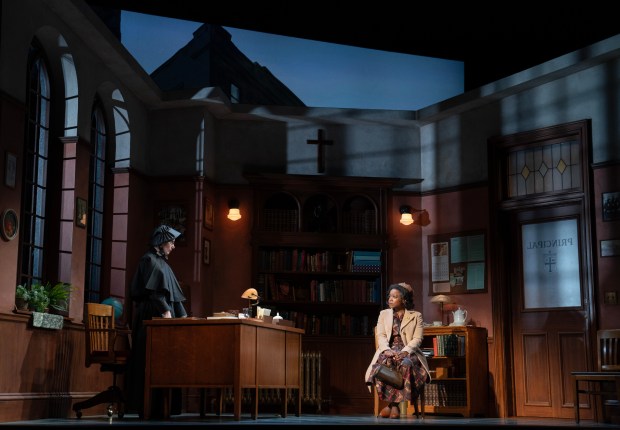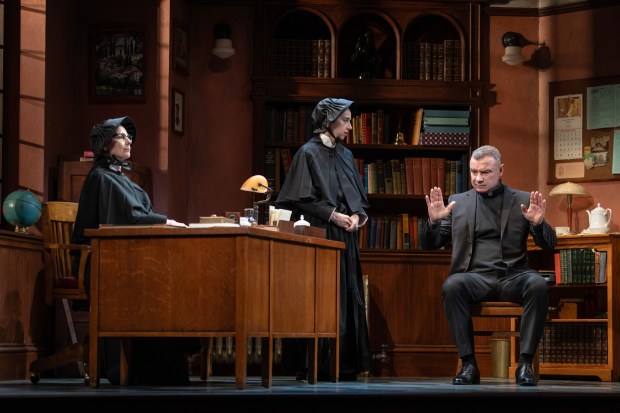[ad_1]
John Patrick Shanley’s “Doubt” was first shot in 2004, near the height of a long crisis in the Catholic Church over abusive priests hiding in plain sight. At the time, it felt like a highly nuanced game focusing on the pain of a nun who blows the whistle, and on a broader level, a game about being unsure about a potential accusation that would surely result in grievous harm. Whether the claim has been made or not.
Twenty years later, all reasonable doubt has been removed from “Doubt.”
Since Sister Aloysius Beauvier first sat at her desk, we’ve learned some depressing things about manipulative people in powerful institutions, and this taut drama now plays out like a cautionary tale in the riveting new Broadway production from Roundabout Theater Company and director Scott Ellis. , a tribute to the women, and some men, who found the courage to stand up to abusers and take the side of the young and vulnerable.
But “Suspicion,” now titled “Suspicion: A Story,” remains a tense and deeply involving theatrical experience.
I used to think this was because it was structured like a masterful procedural, like an 85-minute crime thriller. Sister Aloysius (Amy Ryan), the hard-nosed principal of a parochial school, tries to empower her frightened young aide, Sister James (Zoe Kazan), to find out exactly what Father Brendan Flynn (Liev Schreiber) is doing with a young student. His breath smelled of communion wine.
But in this revival I saw something new and deeply saddening in the play; It’s thanks in no small part to Ryan’s performance in the role, which he took over midway through the run after original star Tyne Daly left the show. Ryan and Ellis’s focus is not on accuracy or precision, but on the character’s struggle against his own exhaustion. Rough, vulnerable, and generous in his performance, Ryan shows us a character who gradually realizes that his unwavering belief in the hierarchy he serves—heck, the way he’s organized his entire life—is incompatible with his moral and practical quest. And the similarly perfect Kazan, whose teacher-priestess has both the advantages and disadvantages of youth, can only look on with dismay at a future she now realizes is coming for her. It’s only a matter of time.
But frankly, all of this pales in comparison to the most devastating scene, which is among the play’s best. any The American drama of the last 20 years. Confrontation between Sister Aloysius and the Black child’s mother, who is under the potentially treacherous influence of Father Flynn. Here the woman, played irresistibly by Quincy Tyler Bernstine, essentially says, and for God’s sake, leave it alone, because if anything else piles on, the kid’s troubles will turn into a pile of rubble.
This particular scene, Shanley’s most masterful, accomplishes more in 10 minutes or so than most writers accomplish in the entire play. He enthusiastically reveals a great truth about how people who hold on to pain learn to compartmentalize, to broker agreements to alleviate complex situations; Of course, none of this is supposed to actually happen. I found it almost unbearable to watch in this particular staging.
I’d argue that Schreiber could have picked out an added note of vulnerability in his performance, but Father Flynn certainly imposes himself, which is exactly what the play calls for, and even if the boy isn’t seen, the actor has certainly nailed his aggressively sycophantic style. As we have now learned, the social costs of engaging with young people are quite high.
“Suspicion” is fast-paced, especially here with David Rockwell’s relatively simple but highly effective set design, which seems to further heighten the play’s inherent sense of dread. You feel a very physical disconnect between community and loneliness, between fresh air and hidden secrets, between the determined teacher and the cornered man with little powers. Because the past is an introduction, I left with more anxiety about the future than when I walked in the door. But there was a game here; a work of art that seems both timely and now timeless, shedding light and doing what American theater is meant to do.
through April 21 by Roundabout Theater Company at the Todd Haimes Theatre, 227 W. 42nd St., New York; www.roundabouttheatre.org
Chris Jones is a Tribune critic.
cjones5@chicagotribune.com
 Best American Comics News bestamericancomics.com started its broadcasting life on December 21, 2022 and aims to offer original content to users. Aiming to share information in technology, science, education and other fields, bestamericancomics.com aims to provide its readers with the most up-to-date and comprehensive. Since the content of the site is created by expert writers, readers are reliable and accurate referrers.
Best American Comics News bestamericancomics.com started its broadcasting life on December 21, 2022 and aims to offer original content to users. Aiming to share information in technology, science, education and other fields, bestamericancomics.com aims to provide its readers with the most up-to-date and comprehensive. Since the content of the site is created by expert writers, readers are reliable and accurate referrers.




